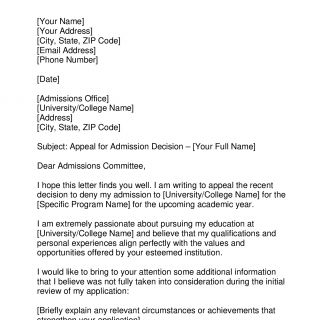ADM Appeal Letter
An ADM (Admission) appeal letter is a critical written communication utilized by a student seeking to challenge a denial of admission to an educational institution. The letter's primary objective is to request a review of the admission decision and potentially secure acceptance into the desired program or institution, making it a crucial tool in the admissions process.
Purpose: To appeal and challenge a denial of admission.
Parts:
- Introduction stating the purpose of the letter.
- Explanation of reasons for the appeal.
- Presentation of supporting documentation or evidence.
- Persuasive argument for reconsideration.
- Polite closing requesting a review of the decision.
Important Fields:
- student's personal details,
- institution's contact information,
- admission decision details.
Required Data:
- clear explanation of reasons for appeal,
- any relevant new information,
- references to policies or regulations.
Additional Documents:
- transcripts,
- letters of recommendation,
- test scores,
- any new achievements or accolades.
Sample of ADM Appeal Letter
[Your Name][Your Address][City, State, ZIP Code][Email Address][Phone Number][Date][Admissions Office][University/College Name][Address][City, State, ZIP Code]Subject: Appeal for Admission Decision – [Your Full Name]Dear Admissions Committee,I hope this letter finds you well. I am writing to appeal the recent decision to deny my admission to [University/College Name] for the [Specific Program Name] for the upcoming academic year.I am extremely passionate about pursuing my education at [University/College Name] and believe that my qualifications and personal experiences align perfectly with the values and opportunities offered by your esteemed institution.I would like to bring to your attention some additional information that I believe was not fully taken into consideration during the initial review of my application:[Briefly explain any relevant circumstances or achievements that strengthen your application].[Provide any new information, updated transcripts, or commendations that support your appeal].[Mention any reasons for discrepancies or challenges that may have impacted your application].I have attached the following documents to support my appeal:Updated TranscriptLetters of RecommendationCertificates of AchievementI sincerely hope that you will reconsider your decision based on the information provided and give me the opportunity to contribute to the diverse and dynamic academic community at [University/College Name].Thank you for your time and consideration. I look forward to the possibility of a favorable response.Warm regards,[Your Name]
Strengths: Provides a formal platform for presenting a case for reconsideration.
Weaknesses: Success is not guaranteed, and the process can be time-consuming.
Opportunities: Offers a chance to rectify any misunderstandings or provide additional context.
Threats: Incomplete or poorly written letters may harm the appeal process.
The letter is usually submitted either electronically or by mail to the institution's admissions office. It is essential to keep a copy of the letter for personal records.
The outcome of the appeal can significantly affect the future academic path of the student. Even if the appeal is unsuccessful, the initiative taken can demonstrate determination and perseverance to future institutions or employers.
Examples and Use Cases:
- Sarah, a high school senior, was denied admission to her dream college due to a misunderstanding in her application. She submitted an ADM appeal letter with additional references from her teachers and was eventually accepted.
- John, a transfer student, appealed his rejection from a competitive program by providing updated transcripts showcasing his improved grades. His appeal was successful.
Alternative forms include email appeals or in-person meetings with admissions officials. Similar analogues can be found in employment appeal letters or financial aid appeal letters, each tailored to specific contexts.

